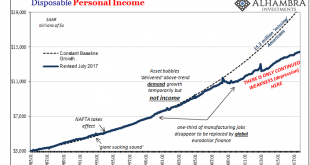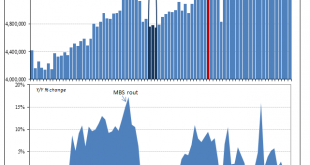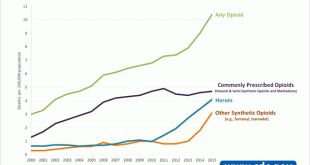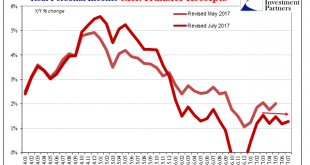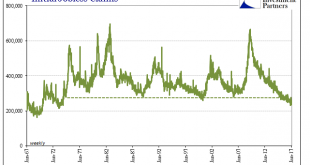Real Personal Consumption Expenditures (PCE) rose 0.6% in September 2017 above August. That was the largest monthly increase (SAAR) in almost three years. Given that Real PCE declined month-over-month in August, it is reasonable to assume hurricane effects for both. Across the two months, Real PCE rose by a far more modest 0.5% total, or an annual rate of just 3.4%, only slightly greater the prevailing average. It is...
Read More »The Real Estate View For A Second Lost Decade
The National Association of Realtor (NAR) reports today that sales of existing homes in the US were down 1.7% in August 2017 from July. At a seasonally-adjusted annual rate of 5.35 million, that’s the lowest pace for resales since July 2016. It is yet another data point reflecting the almost certain end of “reflation” in the economic sense. US Existing Home Sales, Jan 2011 - Jul 2017(see more posts on U.S. Existing...
Read More »The JOLTS of Drugs
Princeton University economist Alan Krueger recently published and presented his paper for Brookings on the opioid crisis and its genesis. Having been declared a national emergency, there are as many economic as well as health issues related to the tragedy. Economists especially those at the Federal Reserve are keen to see this drug abuse as socio-demographic in nature so as to be absolved from failing in their primary...
Read More »Proving Q2 GDP The Anomaly, Incomes Yet Again Fail To Accelerate
One day after reporting a slightly better number for Q2 GDP, the BEA reports today that there is little reason to suspect it was anything more or lasting. The data for Personal Income and Spending shows that the dominant condition since 2012 remains in effect – “good” quarters, or whatever passes for one these days, are the anomaly. There still is no meaningful rebound in income. Real Personal Income excluding...
Read More »Historical Living Standards in International Comparison
On VoxEU, Peter Lindert summarizes his recent work on long-term international comparisons of living standards. Lindert compares nominal incomes per capita, deflated by historical prices (for staple goods). He makes five points: The real income gap between Northwest Europe and the major Asian countries was greater since the 1500s than even Maddison had estimated. Contrary to all previous estimates, Mughal India around 1600 was already far behind both Japan and Northwest Europe. Within...
Read More »Who Voted for Brexit?
In a CEPR Discussion Paper, Sascha Becker, Thiemo Fetzer, and Dennis Novy argue that education and income mainly explain voting outcomes. In the abstract of their paper, the authors write: We find that exposure to the EU in terms of immigration and trade provides relatively little explanatory power for the referendum vote. Instead, … fundamental characteristics of the voting population were key drivers of the Vote Leave share, in particular their education profiles, their historical...
Read More »Jobless Claims Look Great, Until We Examine The Further Potential For What We Really, Really Don’t Want
Initial jobless claims fell to just 234k for the week of February 4, nearly matching the 233k multi-decade low in mid-November. That brought the 4-week moving average down to just 244k, which was a new low going all the way back to the early 1970’s. Jobless claims seemingly stand in sharp contrast to other labor market figures which have been suggesting an economic slowdown for nearly two years. Unemployment insurance...
Read More »Historical Wealth and Income Data
The World Wealth and Income Database.
Read More »“80,000 Hours”
80,000 hours, that’s how many hours we typically spent working over a lifetime, according to Benjamin Todd and the 80,000 hours team. They have published a book/ebook on how to make the best of it. Their advice for a dream job: Look for work you’re good at, work that helps others, supportive conditions: engaging work that lets you enter a state of flow; supportive colleagues; lack of major negatives like unfair pay; and work that fits your personal life. The book discusses strategies to...
Read More »Dynamics of the World Income Distribution
In a Resolution Foundation report, Adam Corlett examines the “Elephant Curve.” The curve shows that between 1988 and 2008 income growth in the 70th to 95th percentile range of the world income distribution was much lower than for almost all other percentiles. Since the lower middle class of rich countries is situated around the 80th percentile of the distribution the Elephant curve has been interpreted as evidence for stagnating middle class incomes in the rich countries. Corlett...
Read More » Swiss Economicblogs.org
Swiss Economicblogs.org

